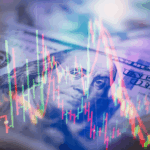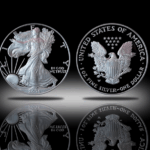Of Elephants and Mice
Circuses are no longer as common as they once were, but some in the reading audience might remember the elephant balanced on a very small circular platform. It’s an apt metaphor for our modern economy. The elephantine world economy balances precariously on the small zero interest rate policy (ZIRP). This is because so very much in the modern economy depends on borrowed money. If loans are to be reliably repaid, interest costs must be low.
America, of course, is no longer at the zero bound. But the publications summarized below have often described how, despite the Fed raising interest rates over the past 29 months, other sources have provided markets the ready liquidity they need and had formerly obtained through fed funds rate-connected channels.
Among wealthy nations, however, there has been a lone ZIRP holdout. Japan has maintained its rates from very slightly below to very slightly above the zero bound for over a decade. But things change. The Bank of Japan raised its interest rate by 0.15% on August 1, 2024. It was the mouse that roared—not at all because Japan is a financial mouse (far from it), but because 0.15% is an interest increase mouse.
Investors far and wide had borrowed from Japan at rates around 1%, then turned around and invested those funds in emerging market bonds at high single- and low double-digit rates. It was easy money. It was safe money. Mostly. The only significant risks were default by the bond-issuing country or a rise in rates by Japan. Well, the rodent roared. So the pachyderm panicked.
At this writing, markets have settled a bit, but the episode has been instructive. The carry trade (which is what this process is called) is much bigger than many people knew, but it’s still only a small portion of the world economy. Still, it gives careful analysts insight into what the future likely holds. Doug Noland calls it de-risking/de-leveraging, and it’s what happens when individuals or institutions that invest in risky but highly lucrative assets decide that the risk/reward balance has shifted against them. It’s time to sell risky investments and buy safe ones.
Now, granted, this is Investing 101. But this episode has revealed that a lot of high-level investors have gotten complacent and forgotten the fundamentals. When Vince Lombardi’s Green Bay Packers arrived at training camp in 1961 after losing the NFL championship game the season before, he greeted them by holding up a pigskin and intoning, “Gentlemen, this is a football.” The Packers won it all that year.
In that great spirit of getting back to the basics, you’ll often receive this investment world counterpart of blocking and tackling emphasis from the below analysts: “Ladies and gentlemen, this is gold.”
Key Takeaways:
- When running with the crowd gets really crowded
- Stepping back from the edge—for now
- Everything can change in a moment
- Are your investments insured?
The McAlvany Weekly Commentary: Yen Carry Trade Cracking Like Humpty Dumpty
David takes a look this week at three points made by Doug Noland in last week’s Credit Bubble Bulletin: 1) the yen carry trade is blowing up, 2) the semiconductor tech trade is blowing up, and 3) deleveraging has started in US corporate credit. David says of these things that, “The thread running through those three bullet points is liquidity, and when liquidity dynamics change, speculative dynamics change and market prices follow. You could say that bull markets are driven by an excess of liquidity, bear markets by its scarcity.” The consequent unwind of the yen carry trade is reverberating through markets far and wide, creating significant global shifts to risk-off mode. David explains that emerging market country bonds are not heavily traded, so the path to invest in them is a freeway going in, but a goat trail coming out. As investors in these bonds head for the congested exits, the issuing countries’ currencies have retracted sharply—many of them down by double digits. David and Kevin also discuss Doug’s second point regarding the tech trade. The bloom may be off the rose for NVIDIA and its ilk as investors realize that the bright promise of AI is attended by serious obstacles. In point of fact, Apple’s recent AI launch was a flop. The hosts also discussed the dilemma faced by Jerome Powell as he weighs the interests and demands of Wall Street against the welfare of world economies.
Credit Bubble Bulletin: Regime Change
Bloomberg quotes JPMorgan as saying that three quarters of the global carry trade has been removed in the wake of Japan’s recent actions. Doug doubts that. “I seriously question whether most EM bond and currency markets have sufficient liquidity to accommodate an aggressive deleveraging and ‘hot money’ exodus. More likely, the backdrop for global leveraged speculation has entered a so-called ‘New Regime.’ There’s problematic leverage now overhanging markets virtually everywhere. Global derivatives markets may be off and running, but true deleveraging has barely got off the sofa.” In other words, the worst is yet to come. There’s nothing new in that conclusion, but the analysis is thorough and timely. He reviews past regime change scenarios—including those in 1989, 1997, and 2008—and compares them with what’s going on now. “Monday,” he noted, “looked like a Regime Change day. Momentous latent risks were revealed. While it ended up not unfolding, there was palpable market fear of global de-risking/deleveraging being transmitted to the highly levered U.S. Credit system.” He then looks at other carry trades. “An unwind of these types of trades would spark panic buying and a collapse in Treasury yields.” In short, these are interesting days, pregnant with possibilities—many of them ominous.
Hard Asset Insights: Minsky Moments and the Butterfly Effect
What a difference a month makes. “Just three weeks ago we had an autopilot market melting-up each sultry summer day,” observes Morgan. “Oh, how the picture has changed.” He cautions that though some level of recovery has occurred, the recent volatility “may just be pre-shocks foreshadowing a much larger and longer earthquake to come.” Able as always to wed theory to practice, he presents readers with the work of economist Hyman Minsky, who theorized “that long periods of investment gains encourage a diminished perception of overall market risk. The perception of diminished risk promotes the leveraged risk of investing borrowed money instead of cash. In short, excessive borrowing fuels financial instability.” A “Minsky moment” occurs when the final straw breaks the camel’s back—perhaps a simple event such as a change in interest rate or currency value—requiring loans to be repaid. Consequent selling of assets causes a flood, which “sends markets into a vicious spiral amid a demand for cash.” Morgan then analyzes the US carry trade, which is even larger than the yen carry trade and just as much at risk. “The real message investors should take from the partial yen carry trade unwind is that policymakers are increasingly cornered. A US dollar that’s too strong quickly becomes a systemic risk, and so does a US dollar that’s too weak (because it strengthens the yen and triggers global deleveraging and risk-off).”
Golden Rule Radio: Market Volatility Approaching New Highs
In customary form, Miles starts things off with a chart review of the metals and other markets. Gold is down slightly, the other PMs a little more. American markets were similarly down, with the dollar being the lone holdout in positive territory. Rob and Tory join Miles to comment upon the devastation wrought by the BoJ increase in interest rate of .15%. This kerfuffle in the currency of a lone Pacific island nation caused damage to world markets seemingly far out of proportion to its size or significance. However, Tory gives some explanation, quickly drawing attention to the emotional component, “What are you doing that drives fear and panic? Direction can be enough to change trajectory.” “And to change sentiment,” rejoins Rob. Miles discusses the effect of Japanese margin calls on the need for cash by borrowers. When such small developments can have such outsized effects on world finance, the hosts emphasize the need for financial insurance. Gold has always had that role, and the need for it is greater now than ever. They also discuss silver, which is at a 90:1 ratio with gold now. Miles gives some insight into how he is handling this development and its possible outcome. The hosts also discuss international events impacting oil and gas that are overshadowed by political news in the US.















